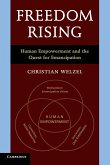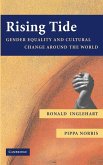Andere Kunden interessierten sich auch für
This is the first study to demonstrate the role of cultural change in the global rise of freedoms.
Hinweis: Dieser Artikel kann nur an eine deutsche Lieferadresse ausgeliefert werden.
Produktdetails
- Verlag: Cambridge University Press
- Seitenzahl: 472
- Erscheinungstermin: 6. März 2014
- Englisch
- Abmessung: 235mm x 157mm x 32mm
- Gewicht: 911g
- ISBN-13: 9781107034709
- ISBN-10: 1107034701
- Artikelnr.: 40078663
- Libri GmbH
- Europaallee 1
- 36244 Bad Hersfeld
- gpsr@libri.de
- Verlag: Cambridge University Press
- Seitenzahl: 472
- Erscheinungstermin: 6. März 2014
- Englisch
- Abmessung: 235mm x 157mm x 32mm
- Gewicht: 911g
- ISBN-13: 9781107034709
- ISBN-10: 1107034701
- Artikelnr.: 40078663
- Libri GmbH
- Europaallee 1
- 36244 Bad Hersfeld
- gpsr@libri.de
Christian Welzel is Chair of Political Culture Research at the Center for the Study of Democracy, Leuphana University Lueneburg, Germany, and President of the World Values Survey Association. He is also special foreign consultant to the Laboratory of Comparative Social Research at the Higher School of Economics, St Petersburg, Russia, and a permanent affiliate of the Center for the Study of Democracy at the University of California, Irvine. A repeated recipient of large-scale grants from the German Science Foundation, Welzel is the author of more than one hundred scholarly publications in high ranking peer-reviewed journals in sociology, political science and psychology. His recent books include Modernization, Cultural Change, and Democracy (with Ronald Inglehart, Cambridge, 2005), Democratization (with Christian Haerpfer, Patrick Bernhagen and Ronald Inglehart, 2009) and The Civic Culture Transformed: From Allegiant to Assertive Citizens (with Russell J. Dalton, Cambridge, 2014).
Introduction
Part I. Understanding Emancipative Values: 1. A theory of emancipation
2. Mapping differences
3. Multi-level drivers
4. Tracing change
Part II. Emancipative Values as a Civic Force: 5. Intrinsic wellbeing
6. Benign individualism
7. Collective action
Part III. Democratizing Impulses of Emancipative Values: 8. Entitling people
9. The rights revolution
10. The paradox of democracy
Part IV. Emancipative Values in Human Civilization: 11. The redirection of civilization
12. The sustainability challenge
Conclusion.
Introduction; Part I. Understanding Emancipative Values: 1. A theory of emancipation; 2. Mapping differences; 3. Multi-level drivers; 4. Tracing change; Part II. Emancipative Values as a Civic Force: 5. Intrinsic wellbeing; 6. Benign individualism; 7. Collective action; Part III. Democratizing Impulses of Emancipative Values: 8. Entitling people; 9. The rights revolution; 10. The paradox of democracy; Part IV. Emancipative Values in Human Civilization: 11. The redirection of civilization; 12. The sustainability challenge; Conclusion.
Introduction
Part I. Understanding Emancipative Values: 1. A theory of emancipation
2. Mapping differences
3. Multi-level drivers
4. Tracing change
Part II. Emancipative Values as a Civic Force: 5. Intrinsic wellbeing
6. Benign individualism
7. Collective action
Part III. Democratizing Impulses of Emancipative Values: 8. Entitling people
9. The rights revolution
10. The paradox of democracy
Part IV. Emancipative Values in Human Civilization: 11. The redirection of civilization
12. The sustainability challenge
Conclusion.
Introduction; Part I. Understanding Emancipative Values: 1. A theory of emancipation; 2. Mapping differences; 3. Multi-level drivers; 4. Tracing change; Part II. Emancipative Values as a Civic Force: 5. Intrinsic wellbeing; 6. Benign individualism; 7. Collective action; Part III. Democratizing Impulses of Emancipative Values: 8. Entitling people; 9. The rights revolution; 10. The paradox of democracy; Part IV. Emancipative Values in Human Civilization: 11. The redirection of civilization; 12. The sustainability challenge; Conclusion.
'Freedom Rising is a singularly impressive study of how social modernization can transform societies and their citizens. Welzel marshals data from the World Values Survey to support his human empowerment model with an impressive store of empirical evidence. This is likely to be the decade's most important book on political development and political culture.' Russell J. Dalton, University of California, Irvine








